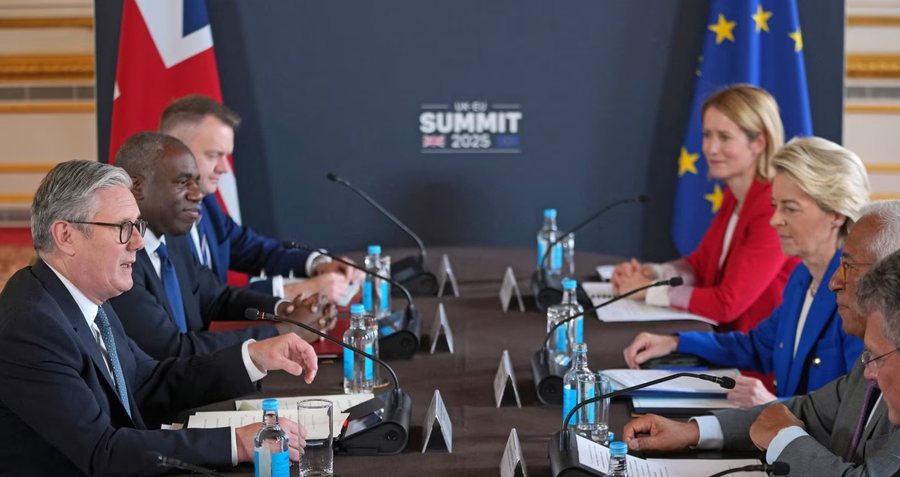
British Prime Minister Keir Starmer signed an agreement with European Union leaders in London on Monday, starting a new chapter in relations between Britain and the EU after Brexit in 2020.
Below you can read more about the issues on which the parties have agreed:
Safety and security
The parties have agreed to cooperate in the field of security and defense at a time when Europe is rearming in the face of the threat from Russia and amid uncertainties about the policies of US President Donald Trump.
The agreement will enable British representatives to participate in several EU ministerial meetings and engage in European military exercises and missions, A2 reports.
The agreement also aims to bring the British defense industry closer to European efforts to build a domestic industrial base.
It paves the way for British firms to benefit from a €150 billion EU fund, which the bloc's 27 member states are currently negotiating. However, an additional agreement and financial contribution from London will be needed.
Britain is expected to benefit significantly from this deal. Companies such as BAE Systems and Rolls-Royce are expected to benefit.
Food and pets
The EU and Britain have agreed to limit controls on food and plant products in future trade. This was a key demand from London.
According to the text of the agreement, "this will mean that the vast majority of movements of animals, animal products, plants and plant products between the United Kingdom and the European Union will be carried out without the certificates or checks required by the rules."
The EU remains Britain's largest trading partner. But British exports to the continent have fallen by 21 percent since Brexit, while imports have fallen by seven percent.
After a long absence, Britain will once again be able to sell burgers, seafood, sausages and other products to the EU, Starmer said. Britons will also be able to travel more easily with their pets.
In return, Britain has committed to dynamic approximation - with the possibility of adaptation over time - to EU sanitary and phytosanitary rules, with some possible exceptions.
In case of disagreement, an independent mechanism will be established to resolve issues, but the European Court of Justice will remain the final authority.
Other economic measures agreed include "closer cooperation" on emissions quotas, allowing British companies to avoid the EU's carbon border tax.
According to the British Government, these measures are expected to add "approximately €10.7 billion by 2040" to the British economy.
Fishing
Fisheries was a particularly important issue for France, which made it a precondition for any wider agreement between London and Brussels.
Britain has agreed to extend until June 2038 an existing agreement that allows European vessels to fish in British waters and vice versa. The current agreement was due to expire in 2026.
Extending the agreement will bring stability and security to fishing crews, without increasing the amount of fish that EU vessels can catch in British waters, according to the British Government.
In Scotland, criticism was immediate. The fishing sector “seems to have been abandoned” by London, said Scottish First Minister John Swinney, while the Scottish Fishermen’s Federation described the deal as a “horror film.”
French Minister Agnes Pannier-Runacher, who oversees the fisheries sector, welcomed the agreement, saying it "will provide economic and political visibility for French fisheries."
Youth movement
Brussels has been pushing for a youth mobility deal that would allow young Europeans to study and work temporarily in Britain, and vice versa. But London remains wary of any deal that resembles free movement and could increase immigration figures.
No clear agreement was reached on Monday, and the text of the agreement does not mention the word "movement."
So, the parties simply expressed their willingness to “work towards a balanced program” that would enable young people to work, study, volunteer or travel in Britain and the EU for a limited period of time. The terms of the program have not yet been determined.
London and Brussels also discussed the possibility of Britain rejoining the student exchange program, Erasmus+.
The number of EU students in Britain has halved since Brexit, falling from around 148,000 in 2019-2020 to 75,500 in 2023-2024.
Border crossings
To ease border crossings, both sides pledged to "continue discussions" so that British citizens can use more "eGates" - automatic gates for passport control.
This should help British holidaymakers avoid "horrific queues" at EU airports, according to the British Government./ REL (A2 Televizion)











